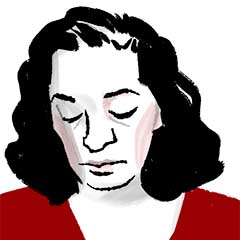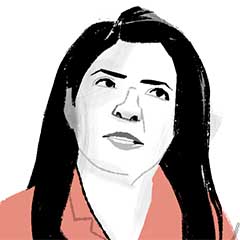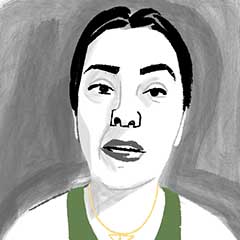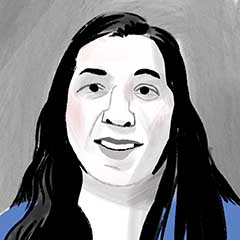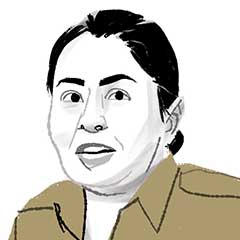Part 4
Black Market Netflix and White Wednesdays
Growing up, VHS videos helped Elnaz Sarbar Boczek learn English and offered her a window to a world outside of Iran.
By Elizabeth Walsh and Brian Williamson | VOA News

“Remember when you would get a DVD and then give it back for a rental fee?”
“This was happening in the late '80s in Iran.”
Elnaz Sarbar
a 43-year-old Iranian American
“There was this guy with a [suitcase], and there were 30 different VHSes in there. He visited us every Friday.”
“You could choose five, or one, or whatever. I think it was $1 a week.”
“And we would have three movies for the week. And then next week, he would give us three new ones.”
“He had Hollywood movies, Bollywood movies, MTV shows.”
“So, that was how I was watching the rest of the world.”
“That's how I learned a bit of English...
... And how I learned about many things that I could not say in society.”
“I couldn’t say that my family played card games.”
“My grandmother was the person who taught me.”
“She's Muslim. She says prayers and stuff.”
“But she also drinks wine, and she taught me how to play card games.”
“But they were illegal, so we couldn’t tell anybody.”
“We also didn't tell anybody that we didn't wear hijab at home, even when men visited.”
“We didn't believe in that stuff.”
“So, we had to lie just to exist.”
“So, you have this cry stuck in your throat ... for 40 years, in my case.”
“Many Iranian women want to say they don't want to wear hijab.”
“[After Mahsa Amini died], I thought, if there’s even a small rally where Iranian women come to the street, I'll be happy, because we've moved one step forward.”
“And then, it goes beyond my imagination, and people are burning scarves in Iran.”
“I'm proud.”
“It's so hard to see them beaten up.”
“Many women were so brave, and they went in front of the security forces and said,
‘We are not scared,’
‘We will get rid of you,’
‘We will get rid of the Islamic Republic.’ ”
“It's amazing to see their bravery.”
“And it's also heartbreaking how they're punished, and how they're brutally oppressed.”
“But at the same time, this is finally what we have been waiting for, for many years.”
“So, I'm really proud of them.”
In 2017, during a monthslong visit in Iran, Sarbar decided to participate in White Wednesday.
White Wednesday refers to a campaign in Iran that began in 2017 where women and men wear white headscarves or pieces of white clothing in public to protest compulsory hijab laws.
The campaign is part of a larger movement known as My Stealthy Freedom.
آزادی یواشکی من
It was started by Iranian journalist and activist Masih Alinejad, who currently hosts a weekly segment on VOA Persian.
The movement gained significant attention, with many women posting on social media pictures and videos of themselves without the hijab.
By wearing white on Wednesdays, participants show solidarity with the women in Iran who are calling for greater personal freedom.
Sarbar recorded her two-hour trip via subway and on foot across Tehran.
“At the end of this journey, I'm almost done with taking videos, and I'm one block away from my friend's house.”
“He lived very close to one of the military bases, which I was not thinking about at the time.”
“I'm walking on the street with no scarf.”
“As I'm walking, I saw this motorcycle, a red motorcycle.”
“I was like, ‘Oh, that's cute.’ ”
“I have a motorcycle. I like motorcycles. Cute!”
“And then I look at it more closely and see it’s a 2000 cc, a high-capacity motorcycle.”
“And I knew that only security forces were allowed to have high-capacity motorcycles in Iran at the time.”
“I looked in the mirror of this motorcycle and noticed the security officer was looking at me, but I pretended that I didn't see him.”
“Luckily, it was a one-way street, so he had to turn onto a different street.”

“Remember when you would get a DVD and then give it back for a rental fee?”
“This was happening in the late '80s in Iran.”
Elnaz Sarbar
a 43-year-old Iranian American
“There was this guy with a [suitcase], and there were 30 different VHSes in there. He visited us every Friday.”
“You could choose five, or one, or whatever. I think it was $1 a week.”
“And we would have three movies for the week. And then next week, he would give us three new ones.”
“He had Hollywood movies, Bollywood movies, MTV shows.”
“So, that was how I was watching the rest of the world.”
“That's how I learned a bit of English...
... And how I learned about many things that I could not say in society.”
“I couldn’t say that my family played card games.”
“My grandmother was the person who taught me.”
“She's Muslim. She says prayers and stuff.”
“But she also drinks wine, and she taught me how to play card games.”
“But they were illegal, so we couldn’t tell anybody.”
“We also didn't tell anybody that we didn't wear hijab at home, even when men visited.”
“We didn't believe in that stuff.”
“So, we had to lie just to exist.”
“So, you have this cry stuck in your throat ... for 40 years, in my case.”
“Many Iranian women want to say they don't want to wear hijab.”
“[After Mahsa Amini died], I thought, if there’s even a small rally where Iranian women come to the street, I'll be happy, because we've moved one step forward.”
“And then, it goes beyond my imagination, and people are burning scarves in Iran.”
“It's so hard to see them beaten up.”
“I'm proud.”
“Many women were so brave, and they went in front of the security forces and said,
‘We are not scared,’
‘We will get rid of you,’
‘We will get rid of the Islamic Republic.’ ”
“It's amazing to see their bravery.”
“And it's also heartbreaking how they're punished, and how they're brutally oppressed.”
“But at the same time, this is finally what we have been waiting for, for many years.”
“So, I'm really proud of them.”
In 2017, during a monthslong visit in Iran, Sarbar decided to participate in White Wednesday.
White Wednesday refers to a campaign in Iran that began in 2017 where women and men wear white headscarves or pieces of white clothing in public to protest compulsory hijab laws.
The campaign is part of a larger movement known as My Stealthy Freedom.
آزادی یواشکی من
It was started by Iranian journalist and activist Masih Alinejad, who currently hosts a weekly segment on VOA Persian.
The movement gained significant attention, with many women posting on social media pictures and videos of themselves without the hijab.
By wearing white on Wednesdays, participants show solidarity with the women in Iran who are calling for greater personal freedom.
Sarbar recorded her two-hour trip via subway and on foot across Tehran.
“At the end of this journey, I'm almost done with taking videos, and I'm one block away from my friend's house.”
“He lived very close to one of the military bases, which I was not thinking about at the time.”
“I'm walking on the street with no scarf.”
“As I'm walking, I saw this motorcycle, a red motorcycle.”
“I was like, ‘Oh, that's cute.’ ”
“I have a motorcycle. I like motorcycles. Cute!”
“And then I look at it more closely and see it’s a 2000 cc, a high-capacity motorcycle.”
“And I knew that only security forces were allowed to have high-capacity motorcycles in Iran at the time.”
“I looked in the mirror of this motorcycle and noticed the security officer was looking at me, but I pretended that I didn't see him.”
“Luckily, it was a one-way street, so he had to turn onto a different street.”

“Remember when you would get a DVD and then give it back for a rental fee?”
“This was happening in the late '80s in Iran.”
Elnaz Sarbar
a 43-year-old Iranian American
“There was this guy with a [suitcase], and there were 30 different VHSes in there. He visited us every Friday.”
“You could choose five, or one, or whatever. I think it was $1 a week.”
“And we would have three movies for the week. And then next week, he would give us three new ones.”
“He had Hollywood movies, Bollywood movies, MTV shows.”
“So, that was how I was watching the rest of the world.”
“That's how I learned a bit of English...
... And how I learned about many things that I could not say in society.”
“I couldn’t say that my family played card games.”
“My grandmother was the person who taught me.”
“She's Muslim. She says prayers and stuff.”
“But she also drinks wine, and she taught me how to play card games.”
“But they were illegal, so we couldn’t tell anybody.”
“We also didn't tell anybody that we didn't wear hijab at home, even when men visited.”
“We didn't believe in that stuff.”
“So, we had to lie just to exist.”
“So, you have this cry stuck in your throat ...
“Many Iranian women want to say they don't want to wear hijab.”
for 40 years, in my case.”
“[After Mahsa Amini died], I thought, if there’s even a small rally where Iranian women come to the street, I'll be happy, because we've moved one step forward.”
“And then, it goes beyond my imagination, and people are burning scarves in Iran.”
“It's so hard to see them beaten up.”
“I'm proud.”
“Many women were so brave, and they went in front of the security forces and said,
‘We are not scared,’
‘We will get rid of you,’
‘We will get rid of the Islamic Republic.’ ”
“It's amazing to see their bravery.”
“And it's also heartbreaking how they're punished, and how they're brutally oppressed.”
“But at the same time, this is finally what we have been waiting for, for many years.”
“So, I'm really proud of them.”
In 2017, during a monthslong visit in Iran, Sarbar decided to participate in White Wednesday.
White Wednesday refers to a campaign in Iran that began in 2017 where women and men wear white headscarves or pieces of white clothing in public to protest compulsory hijab laws.
The campaign is part of a larger movement known as My Stealthy Freedom.
It was started by Iranian journalist and activist Masih Alinejad, who currently hosts a weekly segment on VOA Persian.
آزادی یواشکی من
The movement gained significant attention, with many women posting on social media pictures and videos of themselves without the hijab.
By wearing white on Wednesdays, participants show solidarity with the women in Iran who are calling for greater personal freedom.
Sadeghiyeh Station
Darvazeh Shemiran Station
Sarbar recorded her two-hour trip via subway and on foot across Tehran.
“He lived very close to one of the military bases, which I was not thinking about at the time.”
“At the end of this journey, I'm almost done with taking videos, and I'm one block away from my friend's house.”
“I'm walking on the street with no scarf.”
“As I'm walking, I saw this motorcycle, a red motorcycle.”
“I was like, ‘Oh, that's cute.’ ”
“I have a motorcycle. I like motorcycles. Cute!”
“And then I look at it more closely and see it’s a 2000 cc, a high-capacity motorcycle.”
“And I knew that only security forces were allowed to have high-capacity motorcycles in Iran at the time.”
“I looked in the mirror of this motorcycle and noticed the security officer was looking at me, but I pretended that I didn't see him.”
“Luckily, it was a one-way street, so he had to turn onto a different street.”
“He had to turn left in front of me, go a little bit further, wait for the cars to pass, and then turn around to come and get me.”
“He’s stopped there, and he's still looking at me as I'm walking across the crosswalk on the street.”
“And I'm like, 'Oh shit, he's going to come back.' ”
“There's a shop a few houses further [down], and I jumped into the shop, and I put my scarf back on.”
“As soon as I finished crossing the street and I'm out of his view, I start running.”
“I didn’t want to be captured, because I had my American passport in my pocket.”
“If they got me, it would’ve been really bad.”
“I saw him through the reflection of the shop door.”
“The guy came back. He actually came and stood.”
“And then he turned back, and he left.”
“During that walk, there were two men sitting inside a parked car.”
“I was really scared.”
“They give me the victory sign.”
“And they look at me like, 'Oh, it must be White Wednesday.' ”

“There was this guy with a [suitcase], and there were 30 different VHSes in there. He visited us every Friday.”
“Remember when you would get a DVD and then give it back for a rental fee?”
“This was happening in the late '80s in Iran.”
Elnaz Sarbar
a 43-year-old Iranian American
“You could choose five, or one, or whatever. I think it was $1 a week.”
“And we would have three movies for the week. And then next week, he would give us three new ones.”
“He had Hollywood movies, Bollywood movies, MTV shows.”
“So, that was how I was watching the rest of the world.”
“That's how I learned a bit of English...
... And how I learned about many things that I could not say in society.”
“I couldn’t say that my family played card games.”
“My grandmother was the person who taught me.”
“She's Muslim. She says prayers and stuff.”
“But she also drinks wine, and she taught me how to play card games.”
“But they were illegal, so we couldn’t tell anybody.”
“We also didn't tell anybody that we didn't wear hijab at home, even when men visited.”
“We didn't believe in that stuff.”
“So, we had to lie just to exist.”
“So, you have this cry stuck in your throat ...
“[After Mahsa Amini died], I thought, if there’s even a small rally where Iranian women come to the street, I'll be happy, because we've moved one step forward.”
“Many Iranian women want to say they don't want to wear hijab.”
for 40 years, in my case.”
“And then, it goes beyond my imagination, and people are burning scarves in Iran.”
“Many women were so brave, and they went in front of the security forces and said,
“I'm proud.”
“It's so hard to see them beaten up.”
‘We are not scared,’
‘We will get rid of you,’
‘We will get rid of the Islamic Republic.’ ”
“It's amazing to see their bravery.”
“And it's also heartbreaking how they're punished, and how they're brutally oppressed.”
“But at the same time, this is finally what we have been waiting for, for many years.”
“So, I'm really proud of them.”
In 2017, during a monthslong visit in Iran, Sarbar decided to participate in White Wednesday.
White Wednesday refers to a campaign in Iran that began in 2017 where women and men wear white headscarves or pieces of white clothing in public to protest compulsory hijab laws.
The campaign is part of a larger movement known as My Stealthy Freedom.
آزادی یواشکی من
By wearing white on Wednesdays, participants show solidarity with the women in Iran who are calling for greater personal freedom.
The movement gained significant attention, with many women posting on social media pictures and videos of themselves without the hijab.
It was started by Iranian journalist and activist Masih Alinejad, who currently hosts a weekly segment on VOA Persian.
Sadeghiyeh Metro Station
Darvazeh Shemiran Station
Sarbar recorded her two-hour trip via subway and on foot across Tehran.
“He lived very close to one of the military bases, which I was not thinking about at the time.”
“I'm walking on the street with no scarf.”
“At the end of this journey, I'm almost done with taking videos, and I'm one block away from my friend's house.”
“As I'm walking, I saw this motorcycle, a red motorcycle.”
“I was like, ‘Oh, that's cute.’ ”
“I have a motorcycle. I like motorcycles. Cute!”
“And then I look at it more closely and see it’s a 2000 cc, a high-capacity motorcycle.”
“And I knew that only security forces were allowed to have high-capacity motorcycles in Iran at the time.”
“I looked in the mirror of this motorcycle and noticed the security officer was looking at me, but I pretended that I didn't see him.”
“He had to turn left in front of me, go a little bit further, wait for the cars to pass, and then turn around to come and get me.”
“Luckily, it was a one-way street, so he had to turn onto a different street.”
“As soon as I finished crossing the street and I'm out of his view, I start running.”
“He’s stopped there, and he's still looking at me as I'm walking across the crosswalk on the street.”
“And I'm like, 'Oh shit, he's going to come back.' ”
“I didn’t want to be captured, because I had my American passport in my pocket.”
“There's a shop a few houses further [down], and I jumped into the shop, and I put my scarf back on.”
“If they got me, it would’ve been really bad.”
“I saw him through the reflection of the shop door.”
“The guy came back. He actually came and stood.”
“And then he turned back, and he left.”
“I was really scared.”
“During that walk, there were two men sitting inside a parked car.”
“And they look at me like, 'Oh, it must be White Wednesday.' ”
“They give me the victory sign.”

“He had to turn left in front of me, go a little bit further, wait for the cars to pass, and then turn around to come and get me.”
“He’s stopped there, and he's still looking at me as I'm walking across the crosswalk on the street.”
“And I'm like, 'Oh shit, he's going to come back.' ”
“As soon as I finished crossing the street and I'm out of his view, I start running.”
“There's a shop a few houses further [down], and I jumped into the shop, and I put my scarf back on.”
“I didn’t want to be captured, because I had my American passport in my pocket.”
“If they got me, it would’ve been really bad.”
“The guy came back. He actually came and stood.”
“I saw him through the reflection of the shop door.”
“And then he turned back, and he left.”
“I was really scared.”
“During that walk, there were two men sitting inside a parked car.”
“And they look at me like, 'Oh, it must be White Wednesday.' ”
“They give me the victory sign.”

“He had to turn left in front of me, go a little bit further, wait for the cars to pass, and then turn around to come and get me.”
“He’s stopped there, and he's still looking at me as I'm walking across the crosswalk on the street.”
“And I'm like, 'Oh shit, he's going to come back.' ”
“As soon as I finished crossing the street and I'm out of his view, I start running.”
“There's a shop a few houses further [down], and I jumped into the shop, and I put my scarf back on.”
“I didn’t want to be captured, because I had my American passport in my pocket.”
“If they got me, it would’ve been really bad.”
“The guy came back. He actually came and stood.”
“I saw him through the reflection of the shop door.”
“And then he turned back, and he left.”
“I was really scared.”
“During that walk, there were two men sitting inside a parked car.”
“And they look at me like, 'Oh, it must be White Wednesday.' ”
“They give me the victory sign.”
